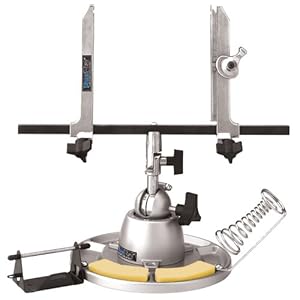This toolkit is a good start:
http://www.amazon.com/Syba-145-Piece-Computer-Tool-SY-ACC65034/dp/B003I4FETM
General tools I use in addition to the above:
-A dedicated soldering station with clamps to hold small parts (that "3rd hand"). Soldering Iron with temperature control is nice.
-A telescoping mirror for seeing around cases.
-A lit magnifying glass for seeing small parts.
-Add in a precision bit toolkit as posted earlier. A clicker torque screwdriver for these is nice, but costs a bit more.
-Specialized bits (ex: pentalobe) are available from iFixit. Purchase when needed as they are expensive.
-Wooden chopsticks from the local Chinese joint work great as probes.
-Crimpers for various communications wires (coax, RJ-45, etc.)
-A digital multimeter for testing circuits. Add in a test lamp and alligator clip leads! Sewing pins are good for testing small female connectors (gives you a place to clamp on the alligator clips).
-Cable testers are important if you plan on debugging building wiring installs. Optional otherwise
-Ethernet patch cables, both wired straight and crossover.
-Parallel data transfer aka "Laplink" cable and null modem RS-232 cables. Always handy.
-Various monitor adapters.
-Gender changers/adapters for serial, SCSI, etc.
-AC outlet tester. Sometimes getting clean power is the whole problem
-AC Power strip.
-Spare screws, jumpers, case standoffs
-Optionally an air compressor is handy for cleaning out really dusty cruddy cases.
-ATX power supply tester
Electronic "tools":
-USB to SATA/PATA adapter for quick connection of HDs and optical drives. Comes with a nice power supply that can be used for other things as well.
-12-in-1 USB flash card reader. Mostly for data recovery, the older ones support dead standards like SmartMedia and xD.
-USB-to-Ethernet adapter. The older ones supported various platforms with included drivers. Later OSes usually have drivers built in. Needed for machiens without onboard adapters or broken adapters.
-A collection of video cards for just about every bus/platform (ISA, VLB, PCI, AGP Universal, NuBus). Useful for testing "blank screen" machines.
-NEC Multisync II or any "true multisync" display. These usually support 15khz analog RGB along with other exotic signals and digital TTL RGB like CGA/EGA. A must with vintage equipment!
-A POST code card. ISA and PCI combo handles most everything. PCIe versions will be needed for the latest machines. Also MiniPCI/PCIe combo cards for laptops.
-I keep a collection of SCSI interface cards for just about every bus including parallel port. Handy for hooking up drives to vintage machines that lack USB and ATA, or are non-PC. I also have USB/Firewire PCI and Cardbus cards handy.
-In addition to the cards above. I have various "bridge" machines that can interface with vintage hardware like 5.25" drives, oddball tape drives and, removable media (Jaz, Syquest, etc.). Windows 9x is usually on these machines as it can run both DOS and older Windows software/drivers. I also maintain Mac bridge machines as well (mostly older beige PPC units with all the legacy ports running OS9 and OSX dual boot). Both have really saved me when I was doing this work professionally for a local computer store and had some "unique" data recovery scenarios.
-A memory tester. I don't own one of these, but dedicated devices are handy if you don't have another machine that takes the memory you want to test to rule out problems.
-A CFL backlight inverter tester. Tests backlight bulbs on LCD displays. Some even have the ability to test the inverters themselves.
Software Tools:
-Disk repair software for various platforms (Spinrite, DiskWarrior for Mac, etc.)
-Live CDs for various platforms (BartPE, MS DaRT etc.)
-A decent virus/malware program on the above
-WSUS/Offline Update CD. Quicker then Windows Update.
-Install CD/DVDs for popular OSes, including common OEM variants (XP Home/Pro, 2000, Server 2003, Vista 32/64bit, 7 32/64bit, MacOS 8.x-9.x, OS X, etc.).
-Now obsolete, but I have a bootable OS CD with Windows 9x, 3.1x, and DOS on it. The boot image is the Windows 98SE startup disk which has handy tools and drivers.
-Hardware test programs, mostly for hard drives. Grab ALL the various HD vendor's tools (Western Digital, Seagate, etc.) including defunct companies like Maxtor. They usually work best as opposed to generic tools. Various memory testers. Check-It! 3.0 is handy for vintage PCs but can only test 16MB of RAM.
-Imaging software (Ghost, Acronis TrueImage, CarbonCopyCloner, etc.)
-File translators. Sadly these have gone out of style, but something like DataViz Conversions Plus and MacLinkPlus is really handy to have around.
-Virtual Machines/Emulators. This is mostly a last resort for data recovery if a host isn't available or if a customer needs legacy software when moving to a new machine.
Note that this toolkit took years to build, it wasn't something I purchased all at once. I'm prepared for just about anything old and new as a result. This was mostly because the store I worked for didn't turn away vintage machines or Macs of various ages (the latter mostly because I had to tools to support them!).

